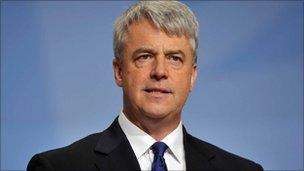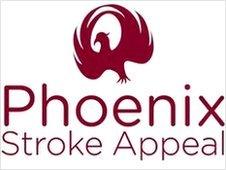Support grows for Phoenix Stroke Appeal
- Published

The Health Secretary Andrew Lansley lends his support to the BBC appeal
The Health Secretary says it is vital people in Cornwall who suffer strokes have access to good aftercare.
Andrew Lansley, a stroke survivor himself, has been lending his support to the Phoenix Appeal.
More than 1,000 people a year in the county are admitted to hospital after a stroke.
BBC Radio Cornwall is supporting the Phoenix Stroke Appeal here in the county.
The new Phoenix Appeal aims to raise £500,000 for patients by providing a world class acute stroke unit at the Royal Cornwall Hospital (RCH).
The total raised so far, as of Monday 26 September, is £45,292.
The money will enhance and improve the existing services to a "gold standard" by allowing the hospital to buy more and better, specialised equipment.
About 1,150 patients are admitted to the RCH with a stroke each year.
Recovery chance increase
The new equipment will help RCH increase survival rates and independence of stroke survivors, reduce the length of their stay in hospital, and enable their clinical staff to offer more effective care.
Stroke is the third largest cause of death and the single largest cause of adult disability in the UK.
More than 150,000 people in the UK have a stroke each year, and problems following one are effects on movement, speech, thought, emotion, continence, sensation and vision.
Care in a stroke unit - with access to skilled, specialist staff and equipment - is the single most effective intervention for any stroke patient requiring hospital admission.
It can significantly reduce the risk of death or disability and offer the best chance of recovery compared to care on a non-specialist ward.
'Limited equipment'
Carol Fletcher, 49, was a cabaret artist performing in Tenerife when she had a stroke at the age of 24.
Ms Fletcher said: "I'd got up from my siesta, because I was working in the evenings, and just collapsed. Everything went all funny and I just ended up on the floor.
"I don't remember anything for about four weeks. I was in a coma."
Eventually Carol was well enough to be flown home where the extent of her disabilities became apparent.
She was bed-bound, unable to speak and struggled to make herself understood.
"Over three years I had a lot of intensive treatment at three of four hospitals, physiotherapy, speech therapy and - being a singer - I was determined to get back to singing and I did get back, eventually."

The appeal aims to raise £500,000 for stroke patients
Carol explained just how important the appeal is as there are "so many things you need after having a stroke and, at the moment, there aren't the facilities."
Tony, now aged 61, was 52 at the time of his stroke and was getting ready to have a bath and also collapsed.
He was taken to the Royal Cornwall Hospital in Treliske and then onto Derriford Hospital in Plymouth, back to Treliske and then to Barncoose.
He was unconscious for two weeks and said he knew he had had a stroke.
"At Treliske, they've only got very limited equipment and, to be honest, they need more."
Getting involved
If you would like to make a donation:
Please make cheques payable to the Phoenix Stroke Appeal and send to:
The Phoenix Stroke Appeal
BBC Radio Cornwall
Phoenix Wharf
Truro
TR1 1UA
Or you bring your spare change to BBC Radio Cornwall's studios at Phoenix Wharf in Truro.
- Published12 January 2011
- Published12 January 2011